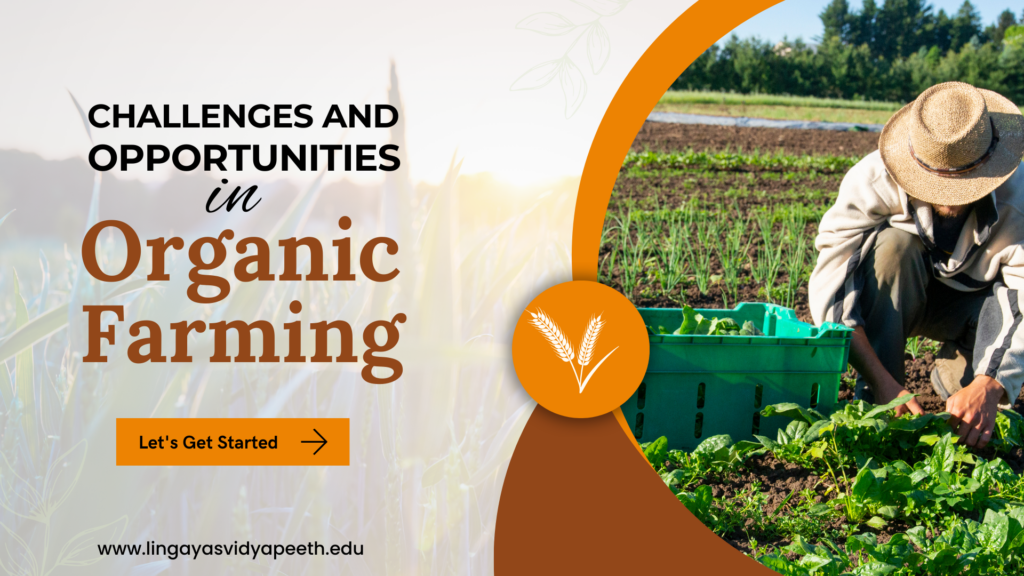
Organic farming challenges are a crucial aspect of the evolving agricultural landscape, presenting a range of difficulties that can impact the efficiency and profitability of organic operations. These challenges encompass various dimensions, including pest management, soil health, certification processes, and market access. Understanding and addressing these organic farming challenges is essential for farmers committed to sustainable agriculture and for those looking to transition from conventional methods to organic practices.

One of the primary organic farming challenges is managing pests and diseases without the use of synthetic pesticides. Organic farming relies on natural pest control methods, such as introducing beneficial insects, using organic-approved pesticides, and employing crop rotation strategies to disrupt pest cycles. While these methods can be effective, they often require more labor and careful monitoring compared to conventional practices. Organic farmers must stay vigilant and adopt integrated pest management (IPM) strategies to mitigate pest-related issues, which can be particularly challenging during periods of high pest pressure or in regions where pest populations are dense.
Soil health is another significant area where organic farming challenges arise. Maintaining and improving soil fertility without synthetic fertilizers involves practices such as composting, cover cropping, and green manures. While these methods contribute to soil health and reduce erosion, they require careful planning and management. Organic farmers need to balance the application of organic matter with the needs of their crops, which can be complex and time-consuming. Additionally, the nutrient availability in organic systems can be less predictable than in conventional systems, necessitating regular soil testing and adjustments to ensure optimal crop growth.
Certification is a critical process for organic farming, but it presents its own set of challenges. Obtaining and maintaining organic certification involves adhering to strict guidelines and standards set by certifying bodies. This process requires comprehensive record-keeping, documentation of inputs and practices, and periodic inspections. For many farmers, especially those new to organic practices, navigating the certification process can be daunting and costly. The paperwork and compliance requirements can be burdensome, and the cost of certification may be prohibitive for smaller operations or those just starting out.
Market access and profitability are additional organic farming challenges that can impact the sustainability of organic operations. While consumer demand for organic products is growing, accessing markets and securing fair prices can be difficult. Organic farmers often face competition from larger producers and may need to invest in marketing and distribution to reach their target customers. Additionally, organic products typically command higher prices, but this does not always guarantee profitability. Farmers must carefully manage their production costs and pricing strategies to ensure they can cover expenses and achieve a sustainable income.
Climate change and environmental factors also pose significant organic farming challenges. Organic farmers are particularly vulnerable to the impacts of extreme weather events, such as droughts, floods, and heatwaves, which can affect crop yields and soil health. Adapting to these changes requires resilient farming practices and may involve adjusting crop varieties, altering planting schedules, or implementing water conservation measures. The unpredictability of climate conditions adds another layer of complexity to managing organic farms and requires ongoing research and adaptation.
Labor availability and expertise are other critical challenges in organic farming. Organic farming often demands more hands-on management and specialized knowledge compared to conventional farming. Finding skilled laborers who are knowledgeable about organic practices can be challenging, particularly in regions with limited access to agricultural education and training. Farmers may need to invest in training and development for their staff to ensure they are equipped to handle the specific demands of organic farming.
In summary, organic farming challenges encompass a wide range of issues, including pest management, soil health, certification processes, market access, climate change, and labor availability. Addressing these challenges requires a combination of innovative practices, ongoing education, and strategic planning. While the transition to and maintenance of organic farming can be demanding, overcoming these challenges is crucial for the long-term success and sustainability of organic agriculture. By staying informed, adapting to changing conditions, and leveraging available resources, farmers can navigate these obstacles and contribute to the growth of a more sustainable and resilient food system.









